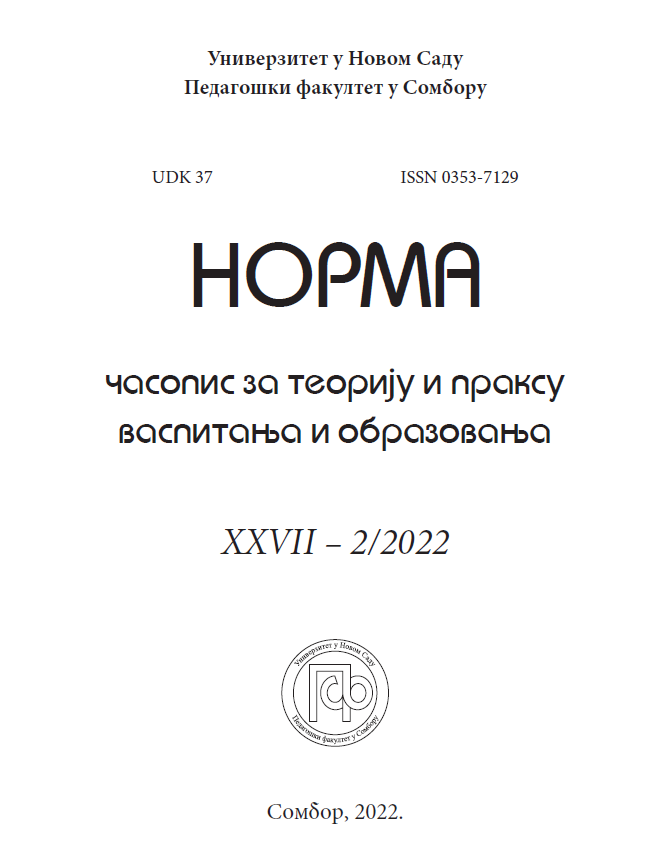The relationship of the application of dıfferent learnıng technıques and teachıng models wıth the school success of students
Abstract
The subject of this research is the connection between the the application of different learning techniques and teaching models and the school performance of students in the field of mathematics and Serbian language. The aim of the research is to identify the basic characteristics of the connection between contextual factors of school environment regarding the application of different learning techniques and teaching models and school success of students in the field of mathematics and Serbian language. Six hundred seventh grade students participated in the research. A descriptive method was used, and data were collected using a scaling technique. The results show that the greater application of different teaching models and techniques of learning in the class, the higher is the grade in mathematics and Serbian language. The emphasis is on effective management of the learning process by the teacher.
References
ЛИТЕРАТУРА:
Bada, S. O. (2015). The Psychogenesis of Knowledge and Its Epistemological Significance. Language and Learning, 5, 23-34.
Brouwer, N., & Korthagen, F. (2005): Can teacher education make a difference? American Educational Research Journal, 42(1), 153–224.
Визек Видовић, В., Ријавец, М., Штетић-Влаховић, В. и Миљковић, Д. (2014): Како остварити позитивно окружење за учење, Београд: Издавачка кућа ,,Klett“.
Вилотијевић, М. и Вилотијевић, Н. (2016): Модели развијајуће наставе I, Београд: Учитељски факултет.
Zhua,C., Wangb, D., Caib, Y. and Engelsa, N. (2013): What core competencies are related to teachers’ innovative teaching? Asia-Pacific Journal of Teacher Education, Vol. 41, No. 1, 9–27, http://dx.doi.org/10.1080/1359866X.2012.753984
Илић, М. (2012): Инклузивна настава. Источно Сарајево: Филозофски факултет.
Jin, F. H. (2001): Innovating Education and Training of Innovative Teachers. Retrieved July 10, 2011 from Outstanding Master of Education Library.
Квашчев, Р. (1980): Способности за учење и личност. Београд: Завод за уџбенике и наставна средства.
Клепић, С. (2018): Нови модели у настави српског језика и књижевности, докторска дисертација, Универзитет у Новом Саду, Филозофски факултет, Одсек за српску књижевност, преузето са http://nardus.mpn.gov.rs/bitstream/handle/123456789/10925/Disertacija.pdf
Крњајић, С. (2002): Социјални односи и образовање. Београд: Институт за педагошка истраживања; Вршац: Виша школа за образовање васпитача.
Lin, C. D. (2009): Researches into Creative Talents and Creative Education. Economic Science.
Миљковић, В. (1993): Како треба учити, Беошкола.
Митић, В. (1999): Иновације и настава, Нови Сад: Будућност.
Мирков, С., Опачић, Г. (1997): Допринос различитих фактора у остваривању веза између навика и техника учења и школског постигнућа ученика. Психологија. 3, 181–196.
Омеровић, М., Џаферагић-Франца, А. (2012): Активно учење у основној школи. Методички обзори 7(1), 167-181.
Приручник за вредновање и самовредновање рада школе (2005): Београд: Министарство просвете и спорта Републике Србије.
Радовановић, Р (1967): Како постићи бољи успех у учењу, Пожаревац: Новинска установа Пожаревац.
Сиденко, А. С. (2006): О иновационим и традиционалним моделима наставног процеса. Настава и васпитање, год. LV, бр. 2, стр. 107-236.
Сузић, Н. (1999): Активна настава. У: Сузић, Н., Стојаковић, П., Илић, М., Бранковић, Д., Милијевић, С., Крнета, Д., Станојловић, С., Ђаковић, П., Бањац, М., Грбић, Ж. (Уред.). Интерактивно учење (181-209). Бања Лука: Министарство просвјете Републике Српске и УНИЦЕФ Канцеларија у Бања Луци.
Sternberg, R. J. (1979): The nature of mental abilities. American Psychologist, 34(3), 214–230.
Flavell, J. H. (1979): Metacognition and cognitive monitoring: A new area of cognitive–developmental inquiry. American Psychologist, 34(10), 906–911.
Freeman, J. (1992): Quality basic education: The development of competence. Paris, itd: UNESCO.
Тршкан, Д. (2006): Мотивацијске технике у настави. Повијест у настави, ИВ (7 (1)), 19-28.
Hilligen, W.(1985): Zur Didaktik des politischen Unterrichts, 4 Aufl., Opladen.
Witzenbacher, K. (1985): Handlungsorientiertes Lernen in der Hauptschule Anregungen und Beispiele für einen hauptschulgemäßen Unterricht, Ansbach.

